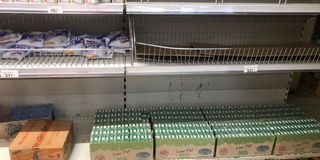Premium
Prices rise as milk shortage hits parts of Kenya

In Nairobi, some supermarkets had completely run out of the commodity while others were only stocking long-life milk.
An acute shortage of packed milk has hit parts of Kenya, with some retailers capping the number of packets a shopper can buy.
In Nairobi, some supermarkets had completely run out of the commodity while others were only stocking long-life milk.
In Nyandarua County, retail outlets increased prices by about Sh10, to between Sh60 and Sh63, depending on the packaging company. A similar price increase margin was also reported in Nairobi.
Nyandarua is listed by the Kenya Dairy Board as the second-best milk producer county after Kiambu.
Retailers have received no supplies for two weeks. The situation is worsening and some must source milk directly from Nakuru and other suppliers from Nairobi and Kiambu, explaining the increase in prices.
Processing and packaging farmers-owned companies attribute the shortage to a decline in milk production of over 50 percent, which has raised processing costs.
At Ol Kalou Dairy 2016, milk collection has reduced to about 23,000kg a day against the traditional 60,000kg.
The company’s processing capacity is 100,000kg a day, meaning the processing and packaging equipment lie idle for the better part of the day.
Modern farming methods
“We indeed have a shortage of milk. We have a hard time supplying our traditional customers. The shortage is due to the prolonged drought and farmers not embracing modern farming methods,” said Mr Kenneth Wachira, the Ol Kalou Dairy 2016 general manager.
The other challenge is unreliable power supply as the company relies on Kenya Power distribution lines, limiting production capacity to 100,000 kilos against a potential of 200,000 kilos in an 18-hours workday.
Nyandarua Public Works executive Mary Mugwanja says the county government had written to the Ministry of Energy requesting transformers to be installed at processing plants in the county.
“We understand the power supply is a big challenge to all processing companies started in Nyandarua in the last three years or so,” she said.
“We have written to the national government requesting transformers, and Ol Kalou Dairy 2016 is among the beneficiaries.
They have also been factored into the current financial year to benefit with Sh2 million to help improve milk production and related logistics. They have already received Sh400,000.”
The company, which has 20,000 dairy farmers as members, gets its milk from other counties including Nakuru, Kirinyaga, Laikipia and Kiambu.
Milk processors
“We are, however, just able to get 36,000 kilos of milk from those counties. One lesson we are learning and is an advantage to us is that the shortage has made us understand our growth potential to become national milk processors and buyers from other parts of the country,” said Mr Kenneth Mathenge, the General Manager Olkalou Dairy 2016.
Agriculture and Livestock executive James Karitu says the department is aggressively training farmers on modern farming practices, fodder and water preservation, and making supplements.
“The challenge is due to farmers' over-reliance on rain-fed farming (and) milk consumption is increasing by the day. The shortage also comes at a time when milk is in high demand. We are happy that farmers are embracing the skills,” Dr Karitu said.
In Mombasa, shoppers decried a shortage of milk.
In most supermarkets, shoppers were required to pick a maximum of four milk packets.
At the Mwembe Tayari branch of Naivas, shoppers who had more packets were asked to pay for only four.
“When I do my Ramadhan shopping I prefer buying in bulk. In the case of milk, I buy in cartons to avoid frequent visits to supermarkets during the month. However, we are now forced to buy four to six packets of milk per person and not more,” said Ms Abdalla.
In Nyanza and Western Kenya, several towns have also been hit by a shortage of milk for the last two weeks.
Supermarkets in the region have resorted to restricting customers to buy one carton containing 12 packets.
The price of a 500ml packet of milk has gone up to between Sh60 and Sh70 depending on the brand.
The Tuzo milk brand is selling at Sh60 per packet at the Quickmart supermarket in Kakamega.
By Waikwa Maina, Farhiya Hussein, Mercy Simiyu and Benson Amadala





